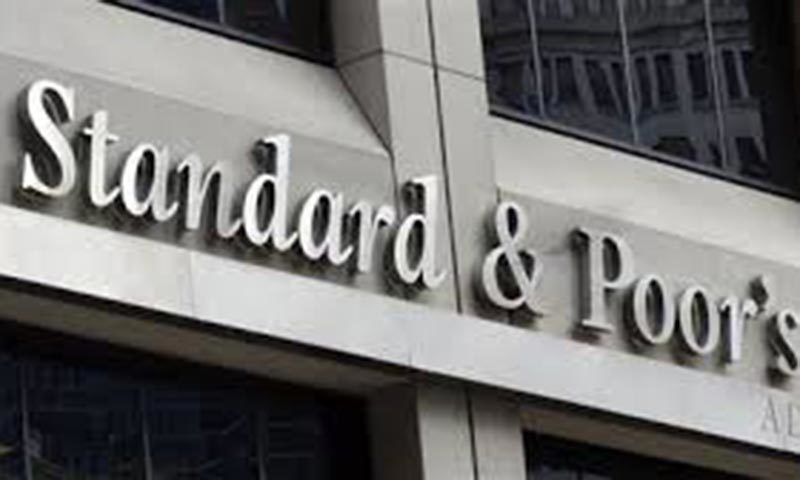Standard and Poor's (S&P) Ratings Services on Monday revised projections for Pakistan's average real Gross Domestic Product (GDP) growth for 2015 to 2017 to 4.6 per cent from 3.8 per cent and also upped its outlook on Pakistan's long-term 'B-' credit rating to ‘positive’ from ‘stable’.
The per-capita GDP was estimated to increase 4.3pc to about $1,460 this year, from 5.4pc in 2014. S&P affirmed Pakistan's 'B-' long-term and 'B' short-term sovereign credit ratings.
S&P attributes the largely positive projections to diversification in income generation, the government's efforts towards fiscal consolidation, improvement in external financing conditions and performance, and stronger capital inflows and remittances.
Lower oil prices have also contributed towards bolstering business confidence and investment expenditure.
GDP per capita
GDP per capita is expected to average 2.6pc over the period 2015-2019 due to greater confidence in the agriculture and construction sectors, and in Pakistan's trading partners.
Inflation
Inflation is expected to average 4.8pc over the period 2015-2019. Year on Year Consumer Price Index inflation followed a downward trend starting October 2014, and continues to decline in 2015 according to data in the State Bank of Pakistan Inflation Monitor.
Inflation slowed to 2.1pc in April 2015 from 2.5pc in the preceding month due to lower fuel and food prices ─ the lowest level since 2003.
Read more: Inflation slows to 2.1pc in April
Government deficit
The general government deficit for 2015 is estimated at 4.5pc of the GDP compared to a previous forecast of 5.5pc. The favourable projections have been attributed to improved collections and tightened expenditure mainly in line with International Monetary Fund reforms.
Greater fiscal consolidation of 1pc of the GDP is expected over 2015-2016 through expansion of the tax base, reduction of tax concessions, greater compliance, and reduction of government expenditure on subsidies and public sector salaries.
The average fiscal deficit forecasted for the period 2016-2019 is 3.5pc, while the net general government debt burden is projected to fall to 50.5pc of the GDP by 2019 from 57pc in 2015 as the deficit decreases. Interest expenditure is expected to fall to 25.5pc of government revenue in 2019, from 30.6pc in 2015.
External performance
The decline in the current account deficit to 1.2pc of the GDP in 2014 is partly reflective of lower oil prices, and is expected to average 2pc over 2015-2019.
As of March 2015, foreign exchange reserves ─ including proceeds from privatisation and donor disbursements ─ increased to $11.6 billion from an average of $6b in 2012-2013.
Narrow net external debt is estimated to average 73.4pc over 2015-2019, and the country's external debt burden is expected to remain moderate, as is external liquidity ─ at 106.8pc ─ over the same period.
The improvement in Pakistan's external debt dynamics has eased access to markets and funding costs for the government, but these could be negatively impacted through volatility in global financial markets, increasing oil prices, and a weaker outlook for key trading partners.
Although Pakistan's external performance indicators stabilised further in 2014, they have a predominantly neutral impact on creditworthiness.
Banking sector
The banking system's high profitability and its strong capitalisation contribute to its soundness. The SBP has a long record of keeping inflation at low levels and utilising market-based instruments to regulate policy.
According to S&P, a more diversified financial and capital market would improve credit metrics and transmit policy more effectively.
The sector is still developing risk assessment and prudential measures, which poses a risk to the banking system.
Risk factors
The S&P analysis revealed that Pakistan's internal and external security risks continue threatening governmental and institutional effectiveness. The material risk of domestic conflict and social upheaval continue to challenge policy responses.
Limited transparency and governance, corruption, nepotism and lack of adequate data undermine the effectiveness and stability of Pakistan's policymaking and political institutions.
Low income, weak monetary policy framework and underdeveloped infrastructure ─ particularly in the energy sector ─ and services have negatively influenced fiscal performance.
Export market uncertainty and a weak business climate pose a risk to the growth outlook for Pakistan's economy.












































